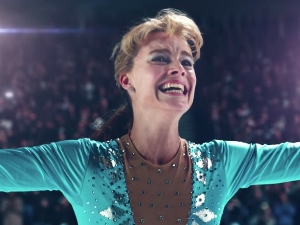[8]
Margot Robbie is Oscar-calibre as disgraced Olympic figure skater Tonya Harding, who was stripped of her titles and banned from the sport after her husband spearheaded an assault on her competitor, Nancy Kerrigan, in 1994. I, Tonya paints the picture of a young girl growing up poor and fatherless, with only a ruthless monster of a mother to guide her. Allison Janney (The West Wing) is in top-form as the foul-mouthed mom, who despite being physically and emotionally abusive, may have instilled in her daughter a tenacious drive to succeed. Once she was of age, Harding traded one abuser for another, marrying Jeff Gillooly (Sebastian Stan) and starting an on-and-off again torid redneck romance that would haunt her career forever. Paul Walter Hauser ends up playing the fourth main character, the whackadoo conspiracy-theorist friend of Gillooly’s who plans the Kerrigan attack. Hauser’s hilarious — and shockingly faithful to the real personality of the man he’s playing.
Even though I think Tonya Harding knew more than the film lets on about the knee-bashing of Nancy Kerrigan, I was nevertheless surprisingly sympathetic to Harding in this movie. I loved that she made her own skating costumes because she couldn’t afford anything professionally sewn. I felt for her when the skating judges held her back for her shoddy appearance and uncouth behavior, despite skating perfect 10 performances all the time. And when the judge bans her for life from figure skating, the only thing she ever knew how to do, Robbie’s performance really got to me.
I was also impressed with the film’s direction and style. There are skating scenes in this movie where the camera glides alongside Harding for extended periods of time. I can’t imagine how such scenes were achieved — they’re stunning. I also love how characters ‘break the fourth wall’ and talk to the camera about what’s going on. This has been done in other movies, but I, Tonya isn’t precious about it. At one point, Harding is talking to us while simultaneously being punched by her husband. Between moments like these and the incorporation of videotaped interviews with the characters, you feel like you have a ringside seat in Harding’s life, experiencing all the pain, triumph, and mind-boggling absurdity right along with her. Written by Steven Rogers, directed by Craig Gillespie.
Academy Awards: Best Supporting Actress (Janney)
Oscar Nominations: Best Actress (Robbie), Film Editing


